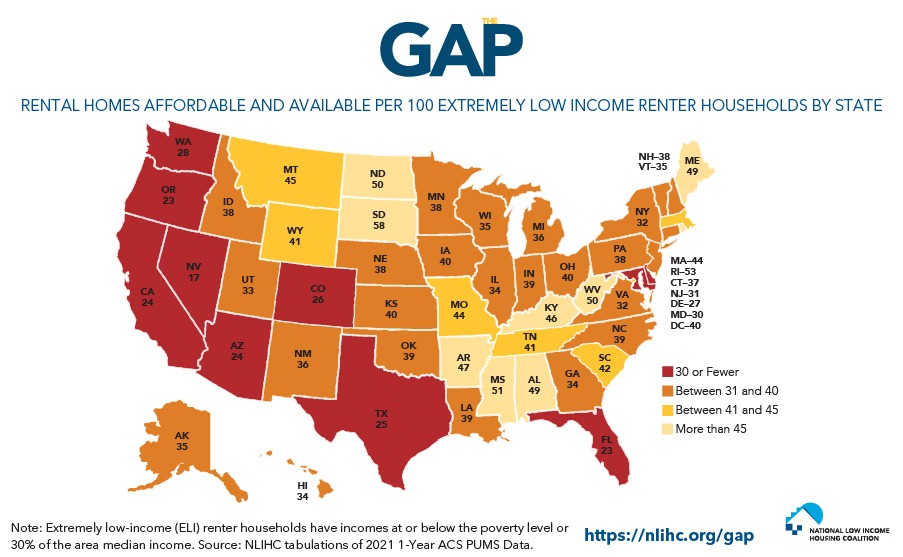Report finds only 34 affordable, available rental homes per 100 extremely low-income renter households in Illinois
For Immediate Release: March 16, 2023
Contact: Kristin Ginger, Manager of Communications & Development, Housing Action Illinois, kristin@housingactionil.org or 312-854-3333
CHICAGO, IL – The Gap: A Shortage of Affordable Homes, a new report released today by the National Low Income Housing Coalition (NLIHC) and Housing Action Illinois, finds a national shortage of 7.3 million affordable and available rental homes for extremely low-income renter households. Every year, The Gap reports on the severe shortage of affordable rental homes available to families and individuals with the lowest incomes. Based on data from 2021, these are among the report’s key findings for Illinois:
- There are only 34 affordable and available rental homes for every 100 extremely low-income renter households in Illinois.
- In Illinois, there are 443,746 extremely low-income renter households, but only 150,392 affordable rental homes available to them, resulting in a shortage of 293,354 affordable and available rental homes.

Extremely low-income households have incomes at or below 30% of the area median family income. In the Chicago area, in 2022, this was an annual income at or below $31,250 for a family of four or $21,900 for a single person.* Income levels in other parts of the state are generally somewhat lower than this.
“Federal budget cuts would deeply exacerbate this problem,” stated Bob Palmer, Policy Director for Housing Action Illinois. “We need our federal legislators to champion sustained, robust investments to fund more Housing Choice Vouchers and increase resources for other federal programs that help people afford the rent.”
The new Gap report finds that the economic repercussions of the COVID-19 pandemic, followed by significant rent increases, drastically impacted the supply of affordable and available rental homes, nationally, in recent years. While rental inflation has cooled going into 2023, extremely low-income renters will continue to face significant barriers to finding and maintaining affordable housing, as their incomes are insufficient to cover even modest rental prices.
This lack of affordable rental homes is especially important when it comes to creating opportunities for young children. No one should have to choose between paying rent and affording basic necessities for their family, such as food and medicine, but the Gap finds that 73 percent of Illinois’ extremely low-income renter households are severely housing cost-burdened, spending more than half of their incomes on housing, with little left over for other essentials. When a family’s housing situation is unaffordable and unstable, chances to lead a healthy life dwindle rapidly.
“Young children who experience homelessness are at higher risk of developmental delays, behavioral problems, worse physical health, mental health problems, and delays in school readiness,” stated Nancy Heil, M.D., Chair of the Housing Committee at the Illinois Chapter, American Academy of Pediatrics. “We are also particularly concerned that housing insecurity during pregnancy increases the rate of infants born prematurely or with low birthweight, which may result in disability across the lifespan. Homelessness, often caused by unaffordable housing, raises children’s healthcare costs, especially emergency room visits and asthma hospitalizations.
Quality affordable housing can prevent long-term health problems and promote healthy, productive lives. Addressing the severe shortage of rental homes is critical to building a better future for Illinois’ children and communities.
For additional information, visit: https://nlihc.org/gap
* Data for counties and metropolitan areas available at https://www.huduser.gov/portal/datasets/il/il2022/select_Geography.odn
###
About Housing Action Illinois
Housing Action Illinois is a statewide coalition that has been leading the movement to protect and expand the availability of quality, affordable housing in Illinois for more than 35 years. Our 160+ member organizations include housing counseling agencies, homeless service providers, developers of affordable housing, and policymakers. We bring everyone together to work toward our vision of an Illinois where everyone has a stable, good home.
